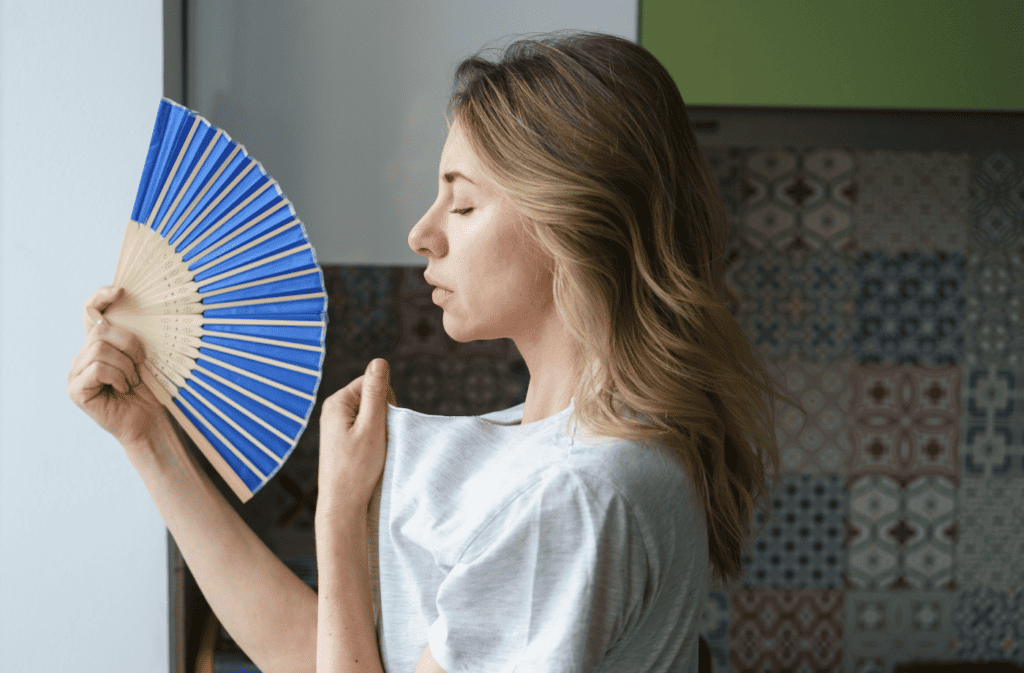Menopause

Menopausal Symptoms
The term menopause is a natural time that refers to the end of menstruation completely or permanently. It is the normal physiological shift from reproductive to non-reproductive age in a woman’s life; in fact, many women feel no symptoms throughout this period. Menopause is not an illness; it usually occurs between the ages of 45 and 55. Some women experience menopause due to surgical procedures or medical treatments, such as chemotherapy and pelvic radiation therapy.
Every woman who gets through menopause can experience various symptoms, such as hot flashes, night sweats, insomnia, headaches, frequent urination, mood swings, fatigue, joint pain, weight gain, vaginal dryness, and anxiety or irritability. By far, hot flashes are the number one symptom women experience during the transition to menopause. The decrease in estrogen and progesterone levels as one enters menopause affects the ability to regulate body temperature and is the source of many menopausal symptoms.
A hot flash is frequently indicated by a sudden sense of warmth in the upper body, particularly the chest, neck, and face. Your skin may occasionally redden, and you may sweat. If this happens while you’re sleeping, it’s known as night sweating, which might disrupt your sleep.
The average duration of these symptoms is around four years, sometimes lasting longer than 12 years.
Acupuncture & Balancing Hormones in Menopause
Acupuncture and Herbal Medicine as effective methods for reducing the frequency and intensity of menopausal symptoms, therefore improving your quality of life. Acupuncture restores the body’s natural balance by acting on the endocrine, sympathetic and parasympathetic nervous systems, so alleviating hot flashes, night sweats, stress, insomnia, back pain, heavy menstrual bleeding in perimenopausal women, and certain mood and digestive symptoms by this technique.
Many factors are related to hormonal imbalance apart from menopause, including PMS, Irregular heavy, painful periods, and fertility challenges. These imbalances may be caused by lack of physical exercise, emotional stress, overwork, and poor diet are all symptoms of the body being out of balance. Acupuncture and herbs can help restore balance to the body and relieve symptoms naturally and without adverse effects.
Diet – Estrogen Rich Food
The Estrogen Rich Food list to Consume:- Eat more fruits and vegetables:
- Fruits: Apple, cherries, grapes, olives, papaya, pears, plums, pomegranates, prunes
- Vegetables: Beets, broccoli, cabbage, carrots, cucumbers, garlic, green peppers, mushrooms, potatoes, pumpkin, rhubarb, seaweeds, squash, sweet potatoes, yams
- Eat beans more often:
- Black beans, kidney beans, navy beans, green or French beans, chickpeas (garbanzo beans), red beans, soybeans, edamame, mung beans
- Eat more tofu and soy
- Soy sprouts, edamame (immature soybeans)
- Seeds/ Nuts
- Flaxseed, sesame seed, black sesame seed, anise seed, pumpkinseed, sunflower Coconut (coconut oil, coconut milk, unsweetened fresh or dried coconut), walnut.
- Legumes
- Alfalfa, black-eye peas, chickpeas (garbanzo beans) lentils provide the best plant-base estrogens,
- Spices & Herbs
- Ginger, licorice, black cohosh, cloves, fennel, thyme, turmeric, sage, hops,
- tea: (mint, chamomile, lemon balm, hibiscus, rose hip and chrysanthemum) teas
- Cereals/Grains
- Barley, corn, oats, rice, rye, wheat
- Eat more fish and seafood (except shrimp and prawns), beef, duck, Chicken and duck eggs.
- Fluids: Drinks lots of water
Things to Avoid
- Avoid stress
- Do not eat at night
- Do not smoke tobacco
- Avoid hot fat/high sugar foods to minimize calories
- Minimize eating spicy foods
- Significantly reduce caffeine and drinking alcohol consumption
Things to Do
- Exercise, yoga, meditation, Tai chi, Qigong
- Maintain your emotion balance: daily chill out
